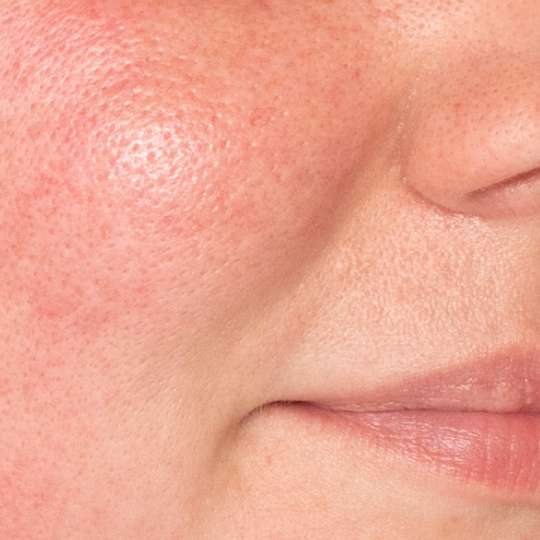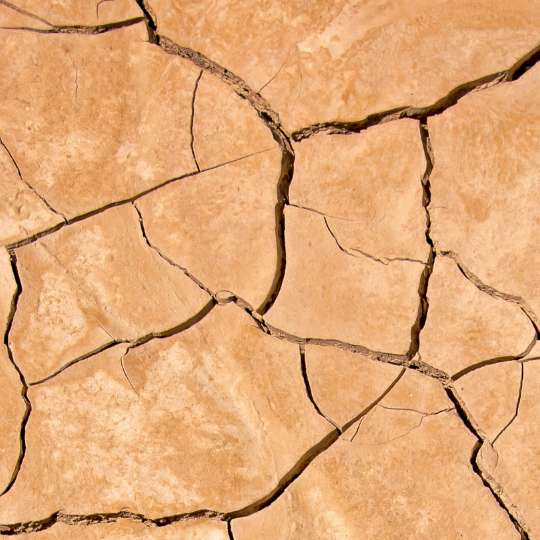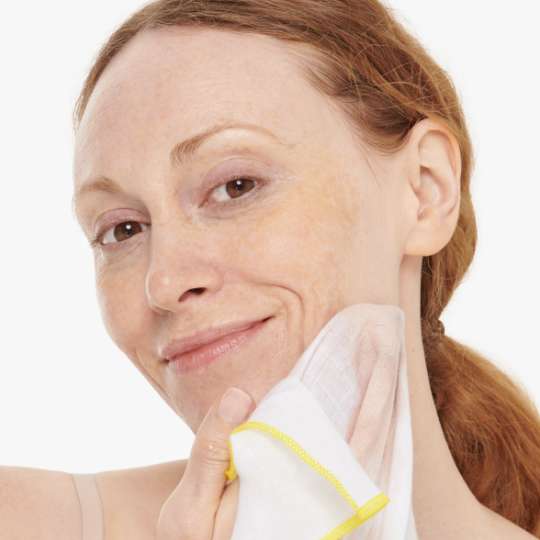

What causes rosacea flare ups?
We’re all agreed that rosacea is a frustrating and uncomfortable skin complaint, but experts are divided as to what causes it in the first place. Theories include a relationship between rosacea and the immune system and a larger than average number of demodex mites existing on the skin, but there’s no definitive answer.
Unfortunately, for this reason, it is not currently possible to cure rosacea. Instead, the condition needs to be managed, and steering clear of common rosacea triggers can help to keep symptoms under control. As a general rule, this means avoiding anything that causes inflammation in the body. Not all of these triggers are completely avoidable, but in most cases, making small lifestyle tweaks has the potential to make a real difference to the feel and appearance of your rosacea.
“When someone comes to me with rosacea, I listen to their story to hear where the triggers are,” says consultant dermatologist Dr Justine Hextall. “I don’t believe you wake up one morning with rosacea, instead it’s all about looking at what’s changed. For example patients who have been through a very stressful time, started to bloat, found they didn’t tolerate some foods so well and their face started to flush. Everyone is different but my job is to unpick those triggers and put them back together. In my opinion, the worst thing I can do is give a patient antibiotics and say, “that’s rosacea, and by the way it will never settle down.”
9 common rosacea triggers to avoid
Once you have identified your triggers, managing your rosacea will become far easier.
1. Alcohol
We’re sorry, it’s bad news for the red wine drinkers. All alcohol can aggravate rosacea, but your beloved burgundy is one of the worst offenders. Don’t want to take your Saturday night tipple off the menu? We get it. It’s thought that diluting your drink with a mixer can also dilute the side effects of alcohol consumption. Adding ice to your drink, alternating alcoholic drinks with a glass of water and sipping instead of guzzling can also help.
2. Spicy food
Capsaicin, the active component of chillies, triggers nerves in your body to make you feel warmer. To compensate for this, your body then starts to sweat in an attempt to cool you down. It accounts for a runny nose and streaming eyes when tucking into spicy dishes too. As rosacea already causes skin to feel red and uncomfortable, digging into a super spicy meal will only add fuel to an already fiery complexion.
3. Cold weather
Whipping winter winds and rosacea don’t mix. But it does mean a good excuse for some shopping. If you can’t avoid getting out and about when the forecast is showing a gale, wrap up with a high-neck coat and soft scarf nestled close to your face.
4. UV rays
We already know that daily SPF is a non-negotiable part of anyone’s skincare regime, but for rosacea sufferers, this is even more important. This is as UV exposure increases the skin’s inflammatory response. Slathering on sunscreen with SPF 50 each day will go a long way towards protecting the skin. Wearing a wide-brimmed hat and avoiding the sun between the hours of 10AM and 2PM, when it’s at its strongest, will help too.
5. Aerobic exercise
Aerobic exercise like running naturally causes your skin to flush. It’s also, by its very nature, normally enjoyed outdoors. To keep side effects to a minimum don’t run when the weather is especially cold or winds high. Avoiding peak sunshine hours, wearing a cap and choosing shaded routes will help too.
6. Skincare
Skin that’s contending with rosacea likes a skincare routine that’s gentle and consistent, and doesn’t take well to surprises. Avoid anything marketed for spot-prone or oily skin, as these are likely to be too harsh and will strip away at your skin barrier. Nourishing ceramides and soothing niacinamide are your friends here. If you do want to introduce something new to your skincare regime, do so slowly, leaving at least 48 hours between applications. This way you can see if your skin is tolerating it well or not.
7. Hot water
Anything that raises your body temperature will cause rosacea symptoms to flare, and for that reason, languishing in scorching hot baths is off the menu. Showering in and washing your face with hot water can also lead to dryness, so turn the tap down to tepid instead.
8. Emotional stress
Avoiding stress is easier said than done, but taking time out for yourself to unwind should have a positive impact on your symptoms, as well as your general wellbeing. Try starting the day with 15 minutes of meditation or yoga stretches instead of immediately looking at your phone or checking emails. Same goes for before bed. Make your bedroom a tech-free zone to help you get the rest you need.
9. The wrong products getting onto skin
Notice your skin looks red after getting in the shower? It could be down to the products you’re using on your hair and body. “Some people with rosacea have a low-grade allergy or irritation to certain products,” explains Dr Justine Hextall. “A tip I always give is to put moisturiser on your face before you go in the shower, as there’s clearly something there that’s causing a problem with your skin barrier, whether that be shampoo or shower gel. Every time you prevent disruption to the skin barrier it gets stronger and stronger.”
Read, watch and be inspired...



